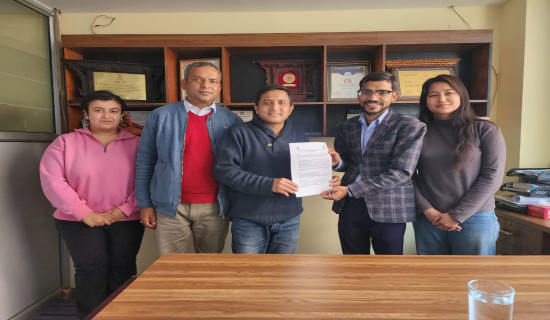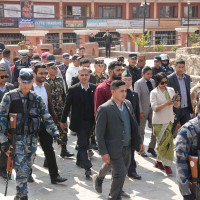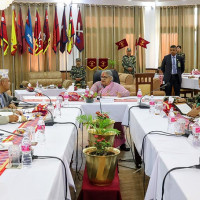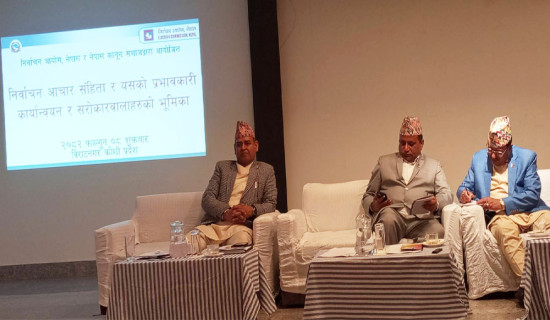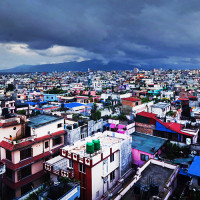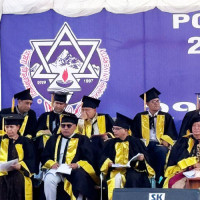- Friday, 20 February 2026
Gen Zs not forming party, seek justice for martyrs
BY A STAFF REPORTER,Kathmandu, Oct. 11: A month has passed since the day that changed the course of the nation’s political history in an unprecedentedly short time. The Gen Z movement of September 8 and 9 led to the fall of the KP Oli-led government, followed by the dissolution of the House of Representatives.
The Gen Z uprising aimed to end corruption in the country and create opportunities for citizens within the country. According to Gen Z voices, they had had enough and were seeking a brighter future with job opportunities. They expressed frustration over the entrenched corruption in the political system and the repeated leadership of the same politicians, accusing them of treating governance like a game of ‘passing the ball.’ They demanded clean, accountable leaders to govern the nation.
Following the protest, the country got its first lady prime minister. Sushila Karki, who also served as the first female Chief Justice, became the interim Prime Minister on September 12 and formed a new Council of Ministers with new leaders, but did not have any Gen Z individuals. Soon after, the Prime Minister announced that the next election would be held on March 5, 2026.
On the other hand, the Election Commission intensified its efforts for a fair and transparent election. Earlier, while talking to The Rising Nepal, Acting Chief Commissioner Ram Prasad Bhandari informed that currently there were 122 registered political parties, and any new political party wishing to participate must complete their registration and obtain a certificate before October 16, as only registered parties will be eligible to take part in the March 5 elections.
However, Gen Z leaders have shown little interest in forming a party or contesting the election. Speaking to The Rising Nepal, a Gen Z leader, Rakhya Bam, said that due to time constraints, they had made no preparations to nominate candidates, but discussions were ongoing regarding exercising their voting rights.
“Today’s youth are aware of the country’s political situation and their power as citizens. We will definitely vote for the right candidates,” she said.
When asked whether they would accept the return of past political leaders if they won the election, Bam said they would do their best to prevent them from contesting. “But if they do contest and win, we will respect the outcome as part of the democratic process,” she added. “What we want are uncorrupted leaders who can truly lead the country.”
Bam further stated that following the formation of the interim government, a Judicial Inquiry Commission had been established to investigate the incidents that occurred during the Gen Z movement. She emphasised that the commission must carry out a fair and transparent investigation and publish its report without delay.
Meanwhile, despite several attempts, The Rising Nepal was unable to reach other Gen Z leaders, including Sudan Gurung, for comments.
The Gen Z uprising not only reshaped the country’s political landscape but also came at a tragic cost. During the protests, 72 individuals lost their lives. Among them was 38-year-old Sauran Kishor Shrestha, who was shot in the chest while standing in front of the Parliament building on September 8.
His brother, Shaishab Kishor Shrestha, said that Sauran was first rushed to the Civil Hospital, but due to a lack of proper equipment and facilities, he was referred to the Trauma Centre at Kathmandu Medical College in an unconscious state. “He received initial treatment there, but it’s unclear whether he took his last breath on the way or at the hospital. He couldn’t survive his injuries,” he said.
Sauran had previously worked in South Korea for five years and returned to Nepal with savings, hoping to build a life at home. Disheartened by the lack of opportunities, he joined the protest in hopes of changing the country’s future. Shaishab stressed that the current government was formed through the sacrifices of martyrs like his brother. “If they truly value the blood of those martyrs, they must find those responsible for shooting and killing innocent protesters and bring them to justice,” he said.
He added, “Those who shot innocent youths in the head and chest, causing instant death, must be arrested. The government formed out of the Gen Z movement has established a Judicial Inquiry Commission, it must now act decisively to identify the culprits and deliver justice to the martyrs.”



